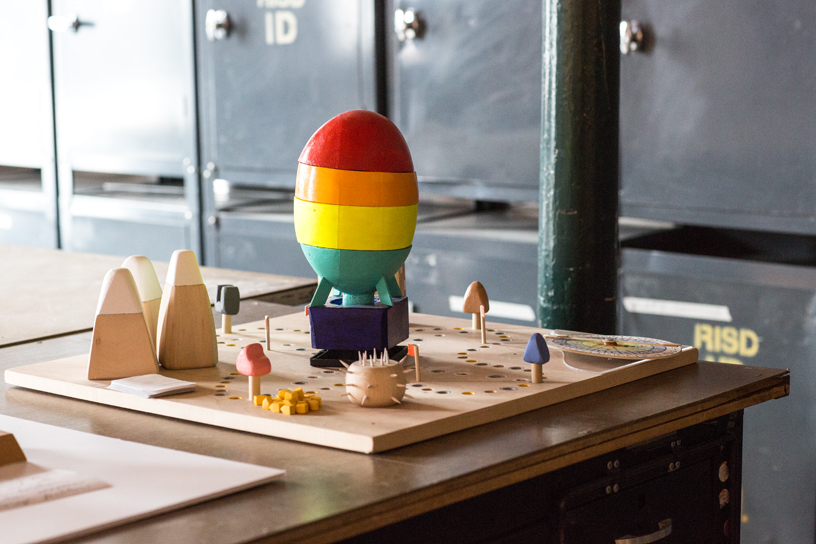
Industrial Design Masters Theses
The Master of Industrial Design program explores design as a vehicle for addressing social, cultural, environmental and other concerns, recognizing that design is not simply a professional service, but rather a way of connecting individual interests and values with a social framework. Students with undergraduate degrees in other fields or with limited design experience are invited to enter the program during Wintersession as a means of preparing to begin the two-year master’s program the following fall.
ID covers a broad range of fields, from product and furniture explorations to design for aerospace and medical applications. Graduate students work independently under the guidance of a faculty advisor and thesis committee, and present their final work verbally, visually and in writing. They also participate in the RISD Graduate Thesis Exhibition, a large-scale public show held annually.
“Graduate candidates in ID don’t necessarily need an undergraduate degree in the field, but they do need strong visual communication skills. For those without an ID background, learning CAD, drawing and model making can be beneficial, and taking a general product design course can provide insight into the design process. Materials-based courses in a medium such as metal, glass, textiles, ceramics or wood also provide a good basis for work in ID.” - Andy Law, Graduate Program Director
Graduate Program Director: Andy Law
These works are licensed under a Creative Commons Attribution-NonCommercial-No Derivative Works 4.0 License.
Theses from 2019
Biomatters : future of biology as material source, Tareq Alzawawi
Mindful interactions, Shreyans Bhandari
Unimproved : land observation at the edge of progress, Adam Somers Bowen
Bitter son, Adam Chuong
Pekka : social software to improve in-game dynamics, Yu Mo
Theses from 2018
Autonomous vehicle futures : designing experiences that enable trust and adoption, Jeremy Bass
Foodways for earthlings : recipes and tools for eating in extreme environments, Maggie Coblentz
Curious things, Allison Davis
Idiosyncratic uniform, Erica Efstratoudakis
Really clean no problems at all, Christina Johnston
Letsqube, Biniam Assegid Kebede
For a better normal : fostering the informal sector in post-hurricane Puerto Rico, as a pathway for economic stabilization, Jonathan W. Melendez Davidson
Harmless Studio, David Thomas Pittman
Dispatches from planet nowhere, Aaron Field Simmons
Radically normal : the menstruation issue, Kathryn Smiley
Talking to computers, Jen Spatz
A place for plastics : bioplastics, bacteria and our thoughtless acts, Megan Valanidas
Memory.zip, Yu-Hsing Wu
Theses from 2017
Communicatronics, Adi Azulay
Balance speaker : efficient work and break, Jin Cao
Talistones : a handful of help for homecoming soldiers, Atulya Changanty
Magkasama, Christina Chen
Retooling : experiments in digital apprenticeship, Ryan Ferguson
Body (less) fitness, Dan Gioia
Love view, Wudi Hong
Connections : a new model to customizing everything, Shao-Hsuan Hou
Motivated motivation : a consulting tool to find new platforms for business, Xiaoxio Jin
Embracing traditional Chinese culture through design, Jiaxuan Li
P-Lax : toys for adults, to play & relax, Zhizi Liu
Empowerment of people of all abilities, Kasia Matlak
Jettison all stories : experimenting with our relationship to the physical, Alyssa R. Mayo
Transitions : designing acceptance in a world of change, Hanna McLaughlin
FLoop : improving eating habits, Namrata Phirke
Transforme : a look at sports beyond the gender binary, Courtney Skabelund
Good times, Tim Stoelting
Bodypart + object, Creama Wong
Impractical community, Zixin Xiong
The emotional intelligence of machines, Lokesh Zope
Theses from 2016
Context clues, Brynn Trusewicz
Obsessed with obsessions: design for obsession, Vara Yang
Interplayable surface: an exploration on augmented GUI that co-exists with physical environments, Hoon Yoon
Theses from 2015
Mealspace : beyond the table, Lauren Tedeschi
Theses from 2014
Material | adventure, Diana Wagner
Material Potential | Recontextualizing Material Libraries, Diana Wagner

